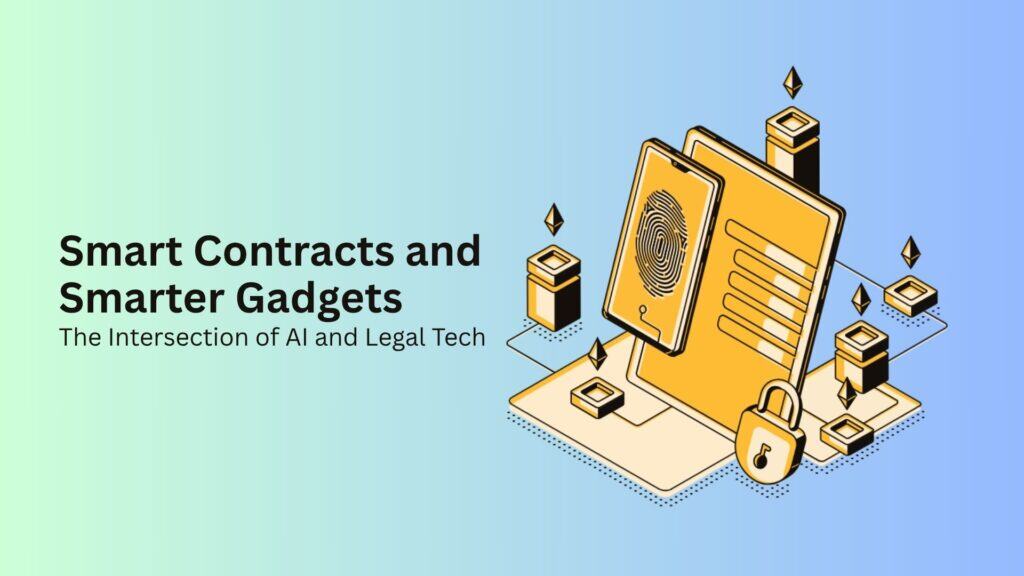The advent of AI and blockchain technology is already changing how legal operations are conducted traditionally. Many lawyers now use AI-powered tools to automate routine tasks such as generative legal writing, contract review, and even legal document data extraction.
The industry is also lucky to have smart gadgets powered by IoT and smart contracts streamlining legal workflows. The goal is to reduce manual intervention and enhance accountability. Though these technologies are already transformative individually, the real power lies in their intersection.
So, in this write-up, we will be exploring the intersection of AI and legal tech, to understand how smart contracts and smarter gadgets are revolutionizing the legal landscape. Read on!
Understanding Smart Contracts
Contents
A smart contract runs on Blockchain technology, the same technology responsible for creating Bitcoin and Ethereum. So, Ethereum made smart contracts popular, and the idea was to have a decentralized computer code that can self-execute after specific conditions have been met without human intervention. In essence, it uses the “if/when … then …” logic statements that must be verified by the Blockchain network.
Why Adopt Smart Contracts
- Transparency and trust: Smart contracts run on the blockchain, which gives all participants equal access to the contract’s terms. Ideally, no participant is able to modify them without the approval from the other parties.
- Automation: There’s no need for intermediaries to oversee the contract execution. As a result, operational costs are reduced.
- Security: Blockchain technology was created in a way that it’s highly resilient to hacking attempts and unauthorized access.
What Exactly is AI’s Role in Legal Tech?
Well, as more people across various industries continue to embrace AI, those in the legal field already see benefits. Today, a lot of lawyers depend on AI to automate time-consuming workflows. AI systems have the capacity to analyze massive volumes of legal documents, predict case outcomes, perform due diligence, and even draft legal arguments.
In fact, there have been fears that AI would replace some lawyers, but most of them are aware that this technology is here to augment them.
Why Adopt AI
- Boost Productivity: Typically, legal work, such as research and drafting legal briefs, is time-consuming. So, using AI to handle these tasks frees up valuable time and resources. As a result, law professionals can then focus on higher-value tasks that require expertise and judgement.
- Accuracy: Manual processes of document analysis and review are prone to errors. This is where AI comes into play. This technology is capable of processing vast amounts of data with higher accuracy than humans. It’s particularly helpful in identifying patterns and compliance issues in legal setups.
- Better Client Experience: Since AI can help you automate repetitive worklows and aids in research, as a lawyer, you can focus more on strategic planning and personalized legal counsel. This means a short response time and better services to your clients.
- Due Diligence and Risk Management: AI can identify and flag inconsistencies and omissions.
Smart Devices and IoT
Smart gadgets are becoming everyday essentials in many countries. These gadgets are equipped with AI, machine learning, or other forms of intelligence to perform actions based on data analysis or user interaction. They are essentially a subset of IoT devices.
In that case, law professionals can use both smart devices and IoT to gather data and automate tasks. For instance, they can use security cameras to gather video evidence for cases or handheld scanners to digitize documents.
Why Adopt IoT-powered Smart Devices
- Automated office devices, such as automated printers and scanners, allow law professionals to share information easily without having to scan one page at a time.
- Smart devices and IoT improve communication and collaboration, even if some team members work remotely.
- IoT devices with advanced analytics and machine learning algorithms provide real-time data that is used in decision-making.
Benefits at the Intersection
As you have seen, AI, Blockchain, and IoT technologies are already powerful individually. However, their integration will transform the legal industry by enabling more intelligent, secure, and efficient systems.
- AI-driven smart contracts: AI integration with smart contracts results in smarter, more adaptive contracts.
- Regulatory compliance: Unlike humans, AI can be used to monitor smart contracts to ensure legal compliance.
- Real-time monitoring: AI can track compliance, flag anomalies, and initiate automated legal actions where necessary using the real-time data provided by IoT.
- Streamline legal operations: The technologies reduce paperwork, automate processes, and ensure transparency, which can influence client loyalty.
Challenges
Integrating AI, Blockchain, and IoT technology comes with some challenges and complexities, such as;
- It’s important to safeguard data collected by IoT devices to prevent exposing sensitive information.
- Ensure you keep up with laws governing these technologies to ensure compliance.
- Because AI relies on the data it was trained on, it can be biased or make mistakes. It’s important to check for accuracy because errors can affect your argument in court.
- Integrating these technologies is expensive.
Conclusion
It’s about time all the industries dealing with sensitive data embraced technologies like AI, Blockchain, and IoT. These technologies become necessary particularly at this age when the legal landscape is evolving at a high rate. The goal is to, of course, improve productivity, efficiency, security, and service delivery. As a result, legal professionals can focus on higher-value tasks to scale the firm.


